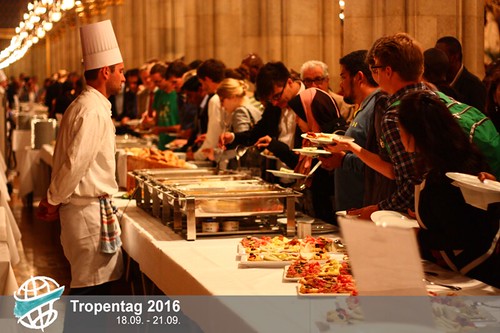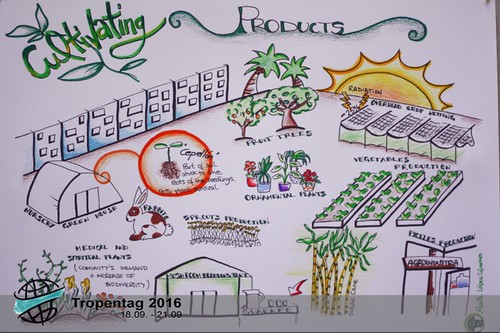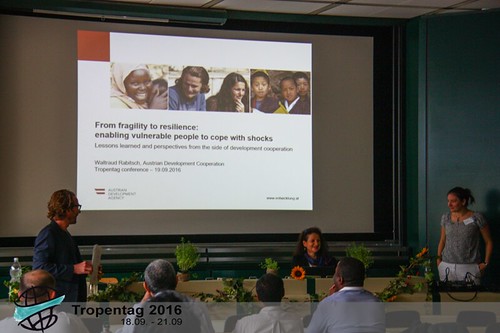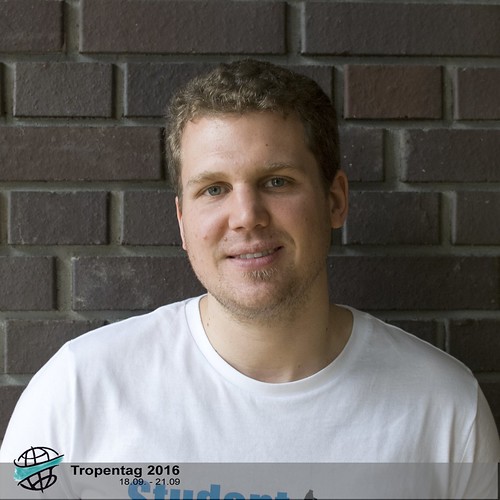Berger's blog
Sustainable development sounds great! On the diverging notions of the path leading to a sustainable, just future
Wed, 09/21/2016 - 10:54 — BergerDo you also get this uneasy feeling when participants from all institutions are always sharing one common opinion, one not really pronounced vision? It´s not that I would mind if we were all working together to achieve all sustainable development goals, a common vision. But this is obviously not the case!
There were some first signs of the diverging notions of sustainable development on Monday's keynote. Someone asked: „So why are there still poor people getting poorer?“ (See Elsby´s blog entry on it here: http://blog.tropentag.de/node/495). Sustainability is a very broad term, comprising also many contradictory opinions on how to reach the goal. Are primed seeds or rather commonly owned landraces the answer to food security? Is it really food security or rather food sovereignty that counts? What is our vision really about? Don’t we need to ask more fundamentally critical questions: which economic system will allow a world of equality, sustainability, and solidarity? And are systems going to be the solution anyway?
Tropentag Work Package 4 (WP4): Implementation
Wed, 09/21/2016 - 09:57 — BergerTropentag is a scientific conference - surely. Yet each serious research project has a work package dealing with implementation (because funders know it´s good for publicity) - so has Tropentag.
Solidarity in a competing world - a theme directly put into practice at the conference dinner on Tuesday night.

In a role game, participants could emotionally experience competition for limited resources. Solidarity developed - at least amongst the most marginalized at the very end of queues sharing the last bits of food. Meanwhile, waiters were emptying half empty plates into the darkness of Vienna´s sewage system.
But - let´s not forget: this conference is not only about solidarity. It´s also about fair use of resources. But what´s fair, anyway? Yet again: food proved to be the most hands-on- area of implementation. The following images of the Tropentag lunch will not need any further comment.
Urban agriculture for more resilience in food security
Tue, 09/20/2016 - 15:09 — BergerDo you know the image of Fidel Castro "smoking" a carrot with the caption „organic by default“? This is pretty much the case of Cuban urban farming practices. When the Soviet block collapsed, farmers were forced to turn to sustainable practices due to a lack of external energy-intensive inputs. At the same time, cities had a need for locally produced food. Today, the city of Havana produces 80 percent of its fruit and vegetable demand within the town borders!
The following picture shows a project by Marta Lopéz Cifuentes, student at BOKU, which is displayed in the registration area.

Today, several events at the Tropentag covered the topic of urban agriculture as a means of enhancing food security (and maybe food sovereignty, too). Cuba is a showcase of urban agriculture, since it has relied on it for several decades already. The government has supported urban agriculture in order to become more independent from imports while farmers appreciated their independence from the state. Surprisingly, despite these two contradictory objectives, policies helped urban producers get access to land, markets and extension services, as the research of Friedrich Leitgeb showed.
Interview: „Solidarity must become a subject of research!“
Tue, 09/20/2016 - 12:10 — BergerTropentag is a research symposium, where the aspect of results' implementation into practice is a priority. During Monday's keynote speeches, the debate about the role of research in fostering solidarity was taken up. Michael Hauser believes research can do a lot to improve solidarity. And yet, according to him, there is a lack of attention on solidarity itself: „Solidarity as such must become a subject of research“, he stated. As an example of solidarity research, he suggested to investigate on how to develop an economy of solidarity.
Tropentag can contribute to promoting solidarity in a competing world. Dr. Hauser encouraged scientists: „We should carefully rethink our research strategies: maintain what has worked with regard to solidarity, but also reexamine those research questions and strategies that haven´t worked. We will have to ask a complete new set of research questions“!
Seeds of hope germinating: Rudolf Buehler presents the project that links farmers in Germany and Zanzibar
Tue, 09/20/2016 - 09:46 — BergerIt is late on Monday, or let´s say it feels late at least. Rudolf Bühler, Chairman of the Swabian Farmer´s Association and Marketing Organisation (BESH) in southern Germany, presented a short film introducing their collaboration with spice farmers in Kerala and Zanzibar.
BESH is well known in southern Germany as a showcase of farmers organising themselves to marketing the multiple values of their produce. BESH farmers have revived a local Swabian pig breed (Schwäbisch Hällisches Landschwein) and are successfully generating fair prices for their members.
The film “Seeds of Hope” shows how the BESH is trying to establish close links between all elements of the value chain - now also by including the direct exchange with spice producers in Kerala and Zanzibar. Rudolf Bühler started this cooperation in Kerala, India, where smallholder farmers produce local varieties of pepper, cardamom or cloves in a traditional multi-layered mixed cropping system, because he recognized how this growing system was already organic before being certified as such.
Predicting the unpredictable?
Mon, 09/19/2016 - 13:35 — BergerIn the workshop „From fragility to resilience - enabling vulnerable people to cope with shocks”, the question of how to deal with the unpredictability of crises, natural catastrophes and shocks led to an inspiring debate. Resilience, in the sense of ability to cope with shocks, is “a concept of an equilibrium” - as Michael Hauser from the Centre for Development Research at BOKU has put it. In contrast to resistance, it is a system´s dynamic response to change.

Leading up to multiple discussion groups organized in a world café method, three guests introduced the topic of resilience from different point of views. It has been most interesting to note how the debate was concentrating on the question of how to make changes, a crisis or even a shock more predictable. Possibly, predicting change is one option of increasing a system´s resilience. However, it may also be a way of resisting it. Furthermore, the question of differentiating between sustainability and resilience arose. In many ways, the latter is part of sustainability.
This year´s student reporters present themselves!
Sun, 09/18/2016 - 16:55 — BergerView a slideshow of this year´s student reporters covering the Tropentag conference at Vienna! Stay informed following our blog, tweets as well as our photo- and video stream.
The student reporters wish you a great conference at the BOKU university!




